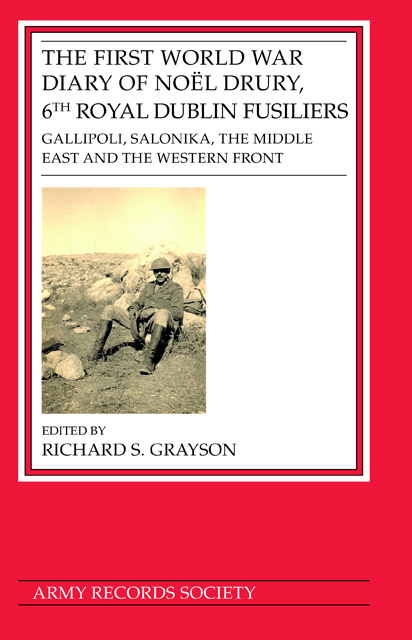 First World War Diary of Noël Drury, 6th Royal Dublin Fusiliers
First World War Diary of Noël Drury, 6th Royal Dublin Fusiliers Book contents
- Frontmatter
- Miscellaneous Frontmatter
- Contents
- List of Illustrations
- Acknowledgements
- List of Abbreviations
- Introduction
- 1 Volunteering and Training, September 1914–July 1915
- 2 The Voyage to the Dardanelles, July–August 1915
- 3 Gallipoli: Landing at Suvla Bay and the Next Ten Days, 7–17 August 1915
- 4 Gallipoli: Digging In, 18 August–October
- 5 The Serbian Front and the Battle of Kosturino, October–December 1915
- 6 The Salonika Front and Hospital, December 1915–September 1917
- 7 Egypt and Palestine, September–December 1917
- 8 Defending Jerusalem and the Battle of Tell ‘Asur, December 1917–July 1918
- 9 France, July–11 November 1918
- 10 Armistice, 12 November 1918– 11 March 1919
- Appendix 1 6th Royal Dublin Fusiliers leaving home for service overseas, 10 July 1915
- Appendix 2 The Effects of the Gallipoli Campaign on the 6th Royal Dublin Fusiliers
- Appendix 3 Officers of the 6th Royal Dublin Fusiliers at Hastière-sur-Meuse, Nov 1918
- Biographies
- Bibliography
- Index
8 - Defending Jerusalem and the Battle of Tell ‘Asur, December 1917–July 1918
Published online by Cambridge University Press: 14 June 2023
- Frontmatter
- Miscellaneous Frontmatter
- Contents
- List of Illustrations
- Acknowledgements
- List of Abbreviations
- Introduction
- 1 Volunteering and Training, September 1914–July 1915
- 2 The Voyage to the Dardanelles, July–August 1915
- 3 Gallipoli: Landing at Suvla Bay and the Next Ten Days, 7–17 August 1915
- 4 Gallipoli: Digging In, 18 August–October
- 5 The Serbian Front and the Battle of Kosturino, October–December 1915
- 6 The Salonika Front and Hospital, December 1915–September 1917
- 7 Egypt and Palestine, September–December 1917
- 8 Defending Jerusalem and the Battle of Tell ‘Asur, December 1917–July 1918
- 9 France, July–11 November 1918
- 10 Armistice, 12 November 1918– 11 March 1919
- Appendix 1 6th Royal Dublin Fusiliers leaving home for service overseas, 10 July 1915
- Appendix 2 The Effects of the Gallipoli Campaign on the 6th Royal Dublin Fusiliers
- Appendix 3 Officers of the 6th Royal Dublin Fusiliers at Hastière-sur-Meuse, Nov 1918
- Biographies
- Bibliography
- Index
Summary
In late December 1917 the 6th Royal Dublin Fusiliers were peripherally involved in the defence of Jerusalem against a Turkish counter-attack, advancing around Deir Ibzia1 west of Ramallah. However, the enemy often retreated rapidly, so in the months to come there was little direct engagement as the battalion strengthened positions and provided work parties for tasks such as road building. Meanwhile, in late January and early February, Drury took part in a ‘contact patrol’ signalling course with members of the Royal Flying Corps and flew over both Jerusalem and Bethlehem in a Bristol fighter. His battalion's only major action of their remaining time in Palestine came in the Action of Tell ‘Asur in early March which followed the capture of Jericho by British forces. The purpose of the attack was to lengthen the British front along the Jordan valley to allow later operations east of it, in part to support the Arab Revolt. The battalion had targets which meant climbing high ground and Drury described how ‘It was impossible to see over any terrace to the one above, and every moment we expected a shower of stick grenades on our heads. We pushed up in as uneven formation as possible, every man either pushing up his pal first or pulling him up from above.’ Following a furious charge by units of the 10th (Irish) Division, ‘old Johnny Turk broke and ran as hard as ever he could leg it, throwing away his rifles and equipment and bombs, and just clearing out – vamoosing – for all he was worth.’
A period of strengthening the line followed and Drury again visited Cairo in late April, but in mid-May he once again succumbed to eye problems. These put him in hospital until early July. By this time it had become clear that the 6th Royal Dublin Fusiliers would be moved to France. In the face of the German Spring Offensive of March 1918, Allenby had been told that he must send British units to the Western Front, replacing most with Indian ones. Twenty-three British battalions in the Middle East were sent, with another ten broken up as reinforcements. Just one British battalion remained in each brigade as part of this process of ‘Indianisation’, so the departure for France marked the end of the 10th (Irish) Division as an ‘Irish’ formation.
- Type
- Chapter
- Information
- First World War Diary of Noël Drury, 6th Royal Dublin FusiliersGallipoli, Salonika, the Middle East and the Western Front, pp. 216 - 242Publisher: Boydell & BrewerPrint publication year: 2022


